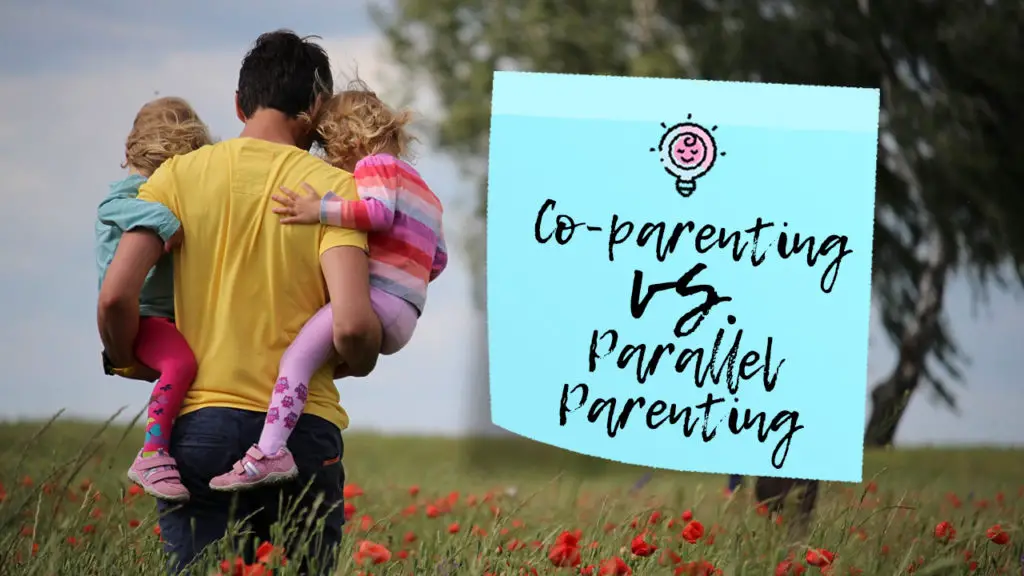If you’re lucky, you will spend a lifetime and build a family with the person your heart truly desires. However, not everyone walks on the same path when it comes to relationships. When things get too complicated to handle, some couples eventually break-up, and for the married ones, it’s divorce. These couples may or may not have children. But what if they do? How can they effectively raise their kids despite the failure of their marriage? What particular parenting plan would work? Would it be co-parenting or parallel parenting?

Data from Statista showed that there were over 700,000 divorces in the United States last 2018.
That may not cover a chunk of a state’s population but those figures are still big, which means married couples who decide to call it quits would also need to decide the future of their children after the marriage is over.
Knowing the Difference Between Co-parenting and Parallel Parenting
Co-parenting is an arrangement wherein both parents have joint custody of their children, which means that both parties share their responsibilities in harmony. Unlike toxic ex-couples, parents who solve problems together when it comes to the holistic development of their children make up a good co-parenting plan. Regardless of the co-parenting boundaries set by both parties, this type of parenting entails a picture of parents being present at school functions or attending doctor’s appointments together.
With minimal to no tension involved, beneficial co-parenting enables the parents to give their children the best of two different worlds.
Meanwhile, parallel parenting is an arrangement wherein the parents raise their children without direct engagement from each other. Although separated, they would still handle their responsibilities to their children, however, independently. In most cases, parents who are unable to communicate with each other effectively go with this parenting style. It helps the parents protect their children from the conflict arising out of their relationship. Thus, minimizing the toxicity and negative impact their discord might bring to their children.
Diversity in Divorce
The dissolution of marriage is not something that happens in a blink of an eye. Yes, feelings may change that quickly, as some people claim, but choosing to end things officially and legally entails a process. Couples need to consider tons of factors before finally deciding to end their marriage; properties, debt, and child custody, among others. However, it doesn’t happen often that both parties have the chance to discuss the matter. And that is why they can agree on the type of divorce that would work for them. After all, getting a divorce comes in many ways. Knowing these things is also one way for you to figure out which parenting style would work best for your situation:
Uncontested
As the name implies, this type of divorce involves the couple agreeing to work together to develop a mutually beneficial arrangement. In an uncontested divorce, both parties file the necessary court papers and live their lives separately. Moreover, the couple won’t have to appear in court since they have already agreed upon the crucial issues after divorce, including child support and property division. If you think that you can still work peacefully with your partner for this matter, this streamlined divorce process is the best way to go.
Contested
The inability to agree on small to crucial issues regarding the terms of separation calls for this type of divorce. Unlike the uncontested divorce wherein both parties don’t have to appear in court for hearings and settlement negotiations, this process involves such legal proceedings. Why? Because both parties need their respective attorneys to raise their arguments and a judge to render its decision. At the end of the process, the judge shall decide on the couple’s debt allocation, joint property division, and child support, especially when it still has. This type of divorce is specifically beneficial for couples who have a significant amount of assets.
Summary
Short and simple—two words that describe a summary divorce. This type of divorce is effective for spouses who don’t have that much as a couple. Meaning, the divorcing parties’ marriage only lasted for a brief period, they don’t have children, and they only own little to no substantial assets and joint properties. When the couple agrees to get a divorce, they will file court papers together for the completion of the process.
Arbitration
It is not new for divorcing couples to have difficulties with an agreement regarding the termination of their relationship. That is why some would hire a private judge who will serve as the arbitrator or the neutral third party. In arbitration, the judge would hear both sides, weigh the arguments and facts presented, and make a decision that the divorcing parties should honor.

Mediation
Similar to arbitration, a mediated divorce or mediation also involves a third party, referred to as the mediator. In this divorce process, the couple hires a mediator so that they could negotiate and communicate more effectively with each other. So what’s the difference then? While the arbitrator has the power to make decisions for the couple, the mediator’s primary purpose in the scene is to advise the said couple.
Collaborative
Apart from arbitration and mediation, a collaborative divorce is also another way of settling the terms of separation without having the need to appear in court. Getting a collaborative divorce would mean that both parties must hire a separate legal counsel or an attorney with expertise in collaborative law to help settle the case. For this to work, both sides must agree to work together and disclose all relevant information. Moreover, they should sign a written agreement that specifies their covenant to collaborate whether it is for choosing the right day care for their kids or something more serious. Should this arrangement fail, the hired attorneys will withdraw from the case, and the couple shall retain different legal counsel.
Default
Every type of divorce discussed beforehand involves both parties trying to settle the terms of their arrangement, be it together or separately. However, that is not always the case. Due to reasons unknown to the spouse seeking the divorce, there are instances when the other party fails to respond to the divorce petition and is impossible to locate. For this reason, the court shall deem the divorce granted by default. If they have children, the remaining spouse shall opt for single parenting in the absence of the other.

Making the Right Choice: What Do You Think Will Work?
There is no specific parenting style that would work in every situation. The success of raising a child lies in the choice of the parents and the mutual agreement between both parties. Thus, it is essential to know what’s best for your situation and your children. Here are some tips on how to make the right choice when choosing between different parenting arrangements:
1. Assess Your Situation
As previously mentioned, it is essential to know your situation for you to have a clearer picture of what type of child custody style will work best. You must agree on arrangements. In doing so, think about how both of you would respond to certain issues involving your children. It will later save you both some parenting regrets. Is your relationship good enough for you to communicate and find solutions to problems? Can you still carry out parental responsibilities together? Or do you prefer to do things separately? As you find answers to these questions, always remember to be honest so that things will still work out in the long run.
2. Be On The Same Page
You may be separated, but you need to be on the same page when it comes to raising your children. If both parties are present, it is not enough for one party to decide how they are going to do their obligations as parents. Are you ready to be a single mom? Both parties must come up with a mutually beneficial arrangement. Establish healthy communication with your ex, which means that aside from voicing out your opinions on how to raise your children, you have to listen to your ex’s side as well. And if you can, set aside all your raging emotions for the sake of your children.
3. Never Involve Your Children
Children, especially those who are still young, are nothing but innocent witnesses of a relationship that is falling apart. Therefore, as parents, it is your duty to make them understand the situation your family is in. But also, bear in mind that making them understand and involving them are two different stories. Your conflicts are yours; keep them to yourselves. Regardless of the parenting style you choose, always go for gentle parenting. Studies show that the impact of divorce on kids includes a higher rate of emotional and academic instability, delinquency, and social conflicts. Try to calm down the storms for them.
4. Always Strive for The Best
Lastly, always strive to give your children the best that they deserve. No matter how much has changed between you and your ex-partner, your children would still expect you to be there for them. They would need you more than ever. For a more effective parenting style, it would be best to set parallel or co-parenting rules. This way, it would be clear for both parties what they should and should not do. In parenting, mistakes may be inevitable, but don’t let it get in the way of raising your kids.

The truth is, the world is not as bright and beautiful as we want it to be, no matter how many times we try to deny it. In such a cruel world we live in, parents like you have to create a safe haven for your children. You must provide light amidst the darkness. In the absence of your guidance, your kids will be lost. That is why you should take care of their overall development so that they may learn how to deal with the things in life as they grow older, even if that means you have to do it independently. Always remember that the failure of your marriage does not equate to the failure of your parenthood.






